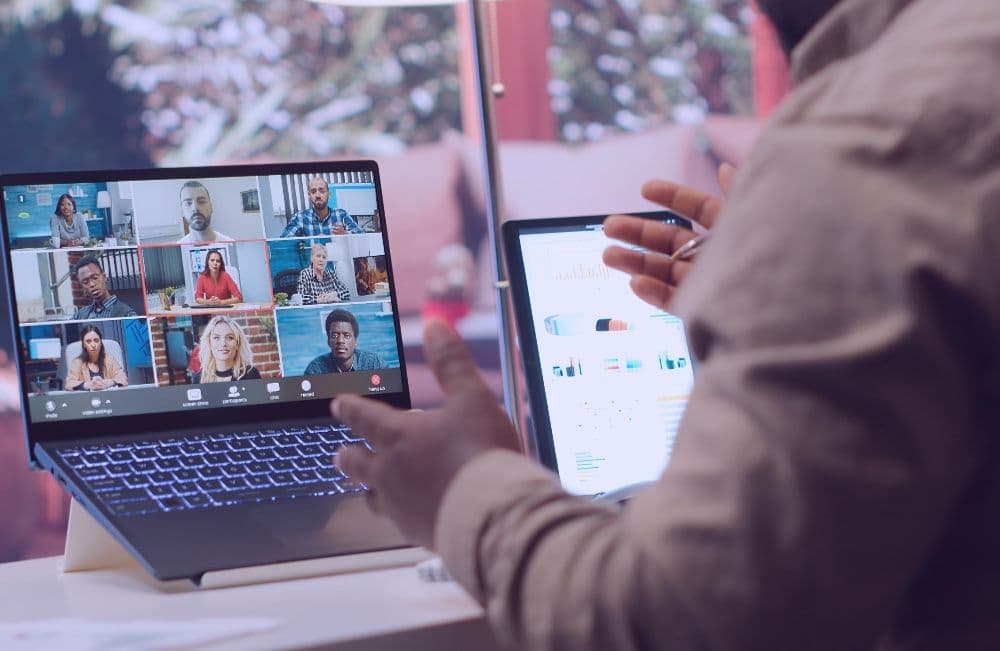

Remote-first systems: Unlocking global talent through intentional organization
APR. 3, 2025
2 Min Read
Remote-first isn't just an accommodation—it's a strategic advantage for accessing global talent.
Building an effective remote-first company isn’t about temporary accommodations—it’s about designing systems that support global talent acquisition and enable team members to thrive. By treating remote work as a sophisticated organizational strategy rather than a transitional arrangement, Lumenalta has transformed how digital talent can be sourced, developed, and retained.
The global talent advantage
Our remote-first approach isn’t simply a reaction to recent workplace trends—it’s been foundational to our identity from day one. We've always recognized that limiting recruitment to specific geographic regions creates artificial barriers to exceptional talent.
By embracing remote work and ditching long commutes and office distractions, our engineering teams maintain a deeper focus on complex problem-solving and benefit from enhanced productivity and accelerated delivery cycles.
However, creating a high-performance distributed workforce requires more than simply enabling video conferencing or providing laptops. It demands deliberately crafted systems that support, connect, and empower team members across different time zones, cultures, and working environments. This intentional design has allowed us to build a company where top talent can thrive regardless of location, delivering superior results for our clients.
For our clients, our remote work model enables multiple benefits:
- Global access: Our borderless talent model means clients can tap into high-caliber talent with specialized expertise that might be unavailable or prohibitively expensive in their local markets.
- Reduced time-to-market: Our framework provides clear guidelines without micromanagement, empowering senior developers to work efficiently and make faster, aligned decisions. This accelerates project completion timelines while maintaining consistent quality across distributed teams.
- Environmental impact: Reduced commuting and office energy use significantly lowers a company’s carbon footprint and supports sustainability goals.
- Enhanced disaster resilience: Distributed teams are less vulnerable to localized challenges including natural disasters, power outages, civil unrest, geopolitical tensions, travel restrictions, and other unpredictable events beyond team members’ control.
- Builds trust: Our consultants commit to our uniquely designed remote protocols and standards. These standards were designed to prioritize building trust with clients, reassuring them that they are not simply hiring a consulting team, but bringing on true partners.
- Operating hours: Teams span US time zones plus 2-4 hours eastward, allowing us to provide clients with extended support and service hours without requiring shift work. This advantage ensures seamless coverage throughout clients’ business days.
It doesn’t just benefit clients— it also empowers team members to do fulfilling work within a diverse, well-tenured community of technical experts. Over the last 25 years, we’ve witnessed numerous advantages:
- Improved employee retention: Greater work flexibility leads to higher job satisfaction and lower turnover, preserving institutional knowledge.
- Increased productivity: Many employees report higher productivity without office distractions and commuting time.
- Work-life integration: Flexible scheduling empowers employees to self-determine their optimal working patterns, manage personal responsibilities, and design their workday in ways that best suit their individual circumstances. This autonomy allows them to work when they're most productive and engaged, enhancing job satisfaction and enabling them to genuinely enjoy their time working.
All in all, working with location-independent teams hasn't hindered us but rather enriched the way we work, keeping customers happy and employees fulfilled.
Core principles of remote-first systems
Because we've worked remotely from the start, we've known that cohesion and transparency should be the cornerstones of our borderless model. We've integrated the following into how we work:
- Asynchronous communication as the default: We use knowledge-sharing platforms that don't require real-time presence, enabling productivity across time zones while reducing meeting fatigue.
- Documentation-driven workflows: Our processes capture decisions, context, and knowledge in accessible formats, creating institutional memory that supports consistent quality regardless of team location.
- Results-based performance measurement: We evaluate contributions based on outcomes rather than activity, focusing on what matters most—the value delivered to clients.
- Trust and autonomy as organizational values: Our culture empowers professionals to make decisions without excessive oversight, creating an environment where innovation flourishes and talent remains engaged.
- Fulfilling work: We offer the opportunity to build cutting-edge tech within a diverse team.
- Work-life harmony as a foundational element: We design roles with sustainable workloads and respect for personal boundaries, recognizing that professionals who enjoy both their work and personal lives deliver superior results. Our approach encourages team members to find fulfillment in their professional contributions while having the freedom to pursue personal passions, creating a more sustainable and satisfying integration of career and lifestyle.
Tips for remote work success
Creating a productive remote environment requires thoughtful infrastructure and purposeful support systems. An infrastructure that removes silos is the bare requirement for consistent productivity. Our onboarding process is structured to help employees integrate and ramp up fast so that they can start producing quickly.
Each team member is assigned a talent coach to ensure outcome-driven communication and reduce friction in remote work. This includes coaching for all consultants to ensure productivity and alignment with company values.
With clear expectations in place, workers gain access to digital tools and resources, such as Calvin, our AI coach assistant, that not only provides personalized support for developers but also assists with goal tracking and coding. Developers can use it to role-play client conversations, enabling them to practice and refine client communication skills and problem-solve in a safe, low-stakes environment. It also helps bridge knowledge gaps, offers real-time feedback on code quality, and suggests optimization techniques tailored to each developer's skill level and learning style. By analyzing work patterns, it can also help team members manage their time more effectively and identify areas for skill development.
Other quick tips:
- Create a documentation-first culture: Ensure knowledge is accessible rather than siloed in individuals' heads or private conversations.
- Schedule focused deep work blocks: Encourage "meeting-free" days or time blocks to allow for concentrated work.
- Develop cultural sensitivity training: Help team members understand and appreciate diverse communication styles across cultures.
- Formalize regular check-ins: Schedule consistent 1:1s between managers and direct reports to address challenges before they escalate.
- Create dedicated digital spaces: Establish virtual "water coolers" where team members can connect informally throughout the day.
- Support healthy boundaries: Discourage after-hours messaging and model respect for time off to prevent burnout.
- Implement results-based performance metrics: Focus on outcomes rather than hours worked or activity levels.
Challenges and solutions
Even the best remote systems face obstacles that require thoughtful solutions. Understanding common remote work challenges is the first step toward building resilient distributed teams.

Effective remote collaboration
We balance synchronous and asynchronous work to maintain productivity across time zones and work preferences. Our technical infrastructure enables global collaboration through comprehensive documentation systems and shared repositories.
Project management tools such as Monday, Slack, JIRA provide cross-cultural communication and workflow visibility. Weekly demos and all-hands meetings keep everyone connected to our mission and celebrate successes.
By combining strategic communication systems with real-time knowledge sharing, we build trust and deliver seamless work from anywhere.
Isolation and burnout
To prevent isolation and burnout, our talent coaches maintain regular communication with team members, actively encouraging them to use their paid time off. These coaches create a supportive environment where team members feel comfortable sharing concerns and collaboratively developing solutions.
“In a remote-first environment, burnout often sneaks in silently,” says senior culture coach Vanessa Fernandez. “We build genuine connections to spot early warning signs—like when someone usually enthusiastic becomes quiet in meetings. These interventions, combined with our community hours, create safety nets against isolation. We don’t just encourage balance—we actively model it by respecting boundaries. The most productive teams aren’t those working the longest hours, but those who feel seen, supported, and energized by their work environment.”
Through these community hours—similar to office hours but designed for connection—we introduce welcome breaks in the workweek that provide both levity and opportunities for team members to bring their whole selves to the workplace.
Maintaining security across distributed environments
Our remote work security protocols protect company and client assets while enabling global productivity. We employ cloud-based solutions with authorized access controls, multi-factor authentication, and VPN requirements for sensitive operations. Regular security training ensures all team members maintain data protection standards regardless of location.
Building company culture without physical presence
Creating a strong organizational identity across global teams requires deliberate effort. We celebrate personal and professional milestones while our badge system recognizes achievements and funds company perks. Talent coaches serve as cultural anchors, providing structure through leadership training and physical health challenges. Accomplishment journals help employees track their growth and contributions over time.
Ensuring equitable opportunities regardless of location
We've implemented several strategies to maintain fairness across our global team, namely through:
- Market-based compensation
- Virtual team-building activities
- Cross-team gamification strategies
- Universal learning and development resources
Our culture goes beyond technology, built on standards that foster real connection. We require cameras be on during meetings for face-to-face interaction and establish overlap hours for effective collaboration across time zones.
“In our remote-first model, location never limits opportunity,” says Paris Law, Senior Culture Coach. “Our approach enables a developer in Madrid to seamlessly partner with a designer in Toronto. That's when you know your equitable approach isn't just working—it's creating possibilities that traditional offices simply cannot match.”
To further support work-life integration, employees receive an annual stipend to use at their discretion for personal or professional development, recognizing that each person's path to growth and wellbeing is unique.
Measuring success: Real-world results
The real measure of success in remote work isn’t just about implementing processes—it’s about achieving market-beating accomplishments. One powerful example from our team demonstrates how our approach translates to tangible client outcomes:
A Lumenalta developer was once "completely gutted" when a client declared the team wasn't delivering as expected. Too many tickets weren't being completed within the sprint timeline—a classic challenge in remote development environments. Rather than defaulting to the standard developer reaction that client expectations were simply too high, this team member applied the emotional intelligence training received through our coaching program.
Through practice in negotiating with clients, addressing concerns professionally, and demonstrating the true complexity of technical tasks to non-technical stakeholders, the developer was able to transform the relationship. The result? In the client's words, this developer became their "trusted lead architect" who is now featured in all their sales demos, outside calls, and urgent requests.
This transformation exemplifies our belief that the right balance of technical skills and emotional intelligence creates "super developers" that clients leverage for their own business success. Our investment in this training directly correlates with long-lasting client relationships that extend for years, providing the most reliable metric of our remote-first system’s effectiveness.
As our survey of over 900 IT leaders confirms, 87% report that investment in emotional intelligence development correlates directly with improved client satisfaction. This is not merely coincidental—it represents the foundation of our approach to remote work excellence.
Interested in seeing how we deliver results for clients? Check out our case studies to explore real-world examples of how our remote-first model drives efficiency, innovation, and impact.



